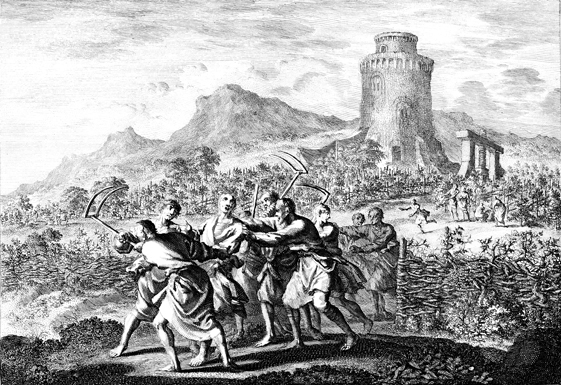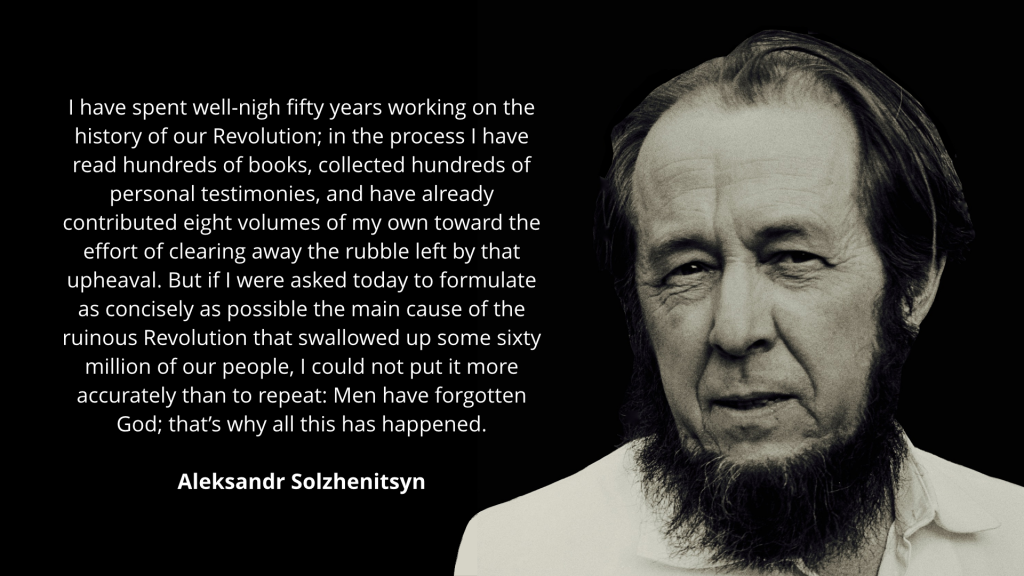
Mass Readings for the 27th Sunday in Ordinary Time:
Isaiah 5.1-7 Psalm 80 Philippians 4.6-9 Matthew 21.33-43
As Thanksgiving approaches, today’s gospel passage gains a special poignance. Jesus speaks today of how God has provided a vineyard—and we can understand this world we inhabit, derive a living from, in which we raise families and build communities, to be that vineyard; and for this be thankful.
We know from the Adam and Eve myth that God at first gave us a garden; but by humanity’s turning from Him, that the garden went from a place of easy provision to being a land of hard work.
What Jesus speaks today of is a further rejection of God—we first turn from Him as our creator and provider, then we rebel against Him as our lawful landlord, seizing what is not ours.
Where the original object of Jesus’ remarks was the poor leadership of Israel by its religious and political elites; today we can regard a deplorably inept leadership class who in government, industry, culture and academia have led us to the brink of disaster, economically and politically, and so debased our culture as to make recovery of our civilization a challenge that likely cannot be answered today without fundamental change.
The great question for us is to whom will we give our allegiance: to God, or to those who have led our society away from God?
The context of the parable is no longer that of an ancient kingdom and its people, Israel of the Bible; but to all the nations of the world today and their respective peoples; to us as Canadians, but also to Americans as the people of the great republic to the south; to Britons, Indians, Chinese and so on, each in their respective communities, pondering how they are governed, and what fruit has come from the civilization each has built.
To clarify for anyone who reduces religious belief to superstitious nonsense, when the Church speaks of God, it is not talking about an old man seated upon a throne of clouds somewhere beyond the veil of the heavens. We are speaking instead of truth, justice, love, all that has been historically held as virtuous by humanity, but we don’t understand these as abstract concepts, but rather as expressions of the creator, who we relate to not as an entity or force of nature, but as a person, who we have relationship with as to a father, and not as ideas we possess.
The consequence of our turn from God, and all true virtue, will not be to possess the world, and each of us our little part of it; but it will be to lose it entirely, to realize the nightmare of the atheist philosopher Thomas Hobbes of an endless war of all against all as races, nations, tribes and families descend into violent contests of domination so as to possess the world, or some part of it.
In Jesus’ parable, the consequence for the tenants who kill the landlord’s son is to themselves be put to a miserable death and the vineyard to be let to new tenants. The son is obviously Christ, and such is the consequence of those who murder Christ in every day and age, who reject Christ and seek to destroy Him in his body, the Church, in every incarnation of Him that is each believing disciple. The result is not to be freed from God and his pestering prophets and insufferable do-gooders, but to enter into the living death of a life without God; and a great many people are already there. To kill Christ is to reject the ethic of loving, sacrificial service, and the kinship of all men and women as children of God in favour of identities rooted in this world.

Now, before there is any thought that I am condemning the current government, let’s put that to rest. No. There is a consistency throughout the Western world and across party lines in terms of the basic conceptions of the role of government and the nature of politics that has led us here.
When the philosopher Friedrich Nietzche declared that “God is dead” he was saying really that God is dead to the modern person. That is, the concern for the divine, the eternal, truth and authentic love was passing away, out of our consciousness both individually and collectively. That doesn’t mean that God is dead, just dead to us.
This then translates into culture, the production of art and music that ceases to reference God, the transcendent, the truthful and the beautiful, and instead descends to give expression to the mundane, the ugly, the dysfunction of this world that is celebrated for being “honest” and “true to our experience”. That’s why so many people dislike modern art, and increasingly, popular entertainment that has grown “dark” in atmosphere, is often vulgar, violent in its imagery, and belligerent in its tone—rooted in this world, it provides nothing to inspire, draw us out of ourselves and upward, but rather feeds our cynicism and reconciles us to sin and death as really the only true constants of our short lives.
This works its way into our politics. Political parties concern themselves less and less with the spiritual well-being of the governed; they focus more and more upon the mundane, seeing in every social problem, not souls in search of meaning and purpose in life, but rather open mouths and outstretched hands simply wanting their animal needs met. This crosses party lines, by and large: the welfare state is defended by all, even as it fails to lift people out of poverty or lessen the strain on the vast, but shrinking, middle class. Money is spread around as the cure for injustice, cash is the answer to everything. Well, cash and things to buy with it. We cease in the minds of the technocrats and their bureaucratic minions to be creatures of flesh and spirit imbued with God-given reason and are instead regarded as animals animated by appetites and desires, led by emotion more than rational reflection.
And while we are still a relatively affluent society, we can afford to warehouse at public expense a significant proportion of our population, 1 in 10 perhaps, in our cities’ downtowns, people without purpose, without the dignity of work or the honour of contributing to the common good. One wonders what will become of them should our capacity to pay for keeping them out of the way disappears.
For those who work, there is no coherent plan, for transportation and energy, no realistic housing policy, a galloping and deepening problem with our infrastructure that is running behind the need to move vast numbers of people around our region daily, to connect them via internet to the world, to light and heat their homes and fuel all the vehicles that too many spend hours in shuttling to and fro.
And the problems look more and more intractable, and the money starts to give out—as we crest $80 billion in COVID payouts (CERB), surely we must realize that this debt will be dealt with through taxation, or inflation; either way, we have received only very temporary relief.
We see in some of the protest of late, not the riotous looters and vandals, but those crying out in longing for a fresh start, the impetus to “burn it all down” with the renewing fire of revolution, without consideration of the millions who will be caught up in the fire and immolated.

And to be sure, there will be no renewal from these revolutionaries because they proceed from the same basic error, and for those who know better, it is a sin: that we can live apart from God, and live only for this world and this life, and that the fullness of life comes from a full belly, and a nice apartment to live in. Nice things, but not enough to make life worth living. That’s something I’ve learned from ministering to people on the margins of our society, the mentally ill, the chronically unemployed, those who through addiction, neglect of education, or simple ingrained laziness, are unemployable. People degenerate, their lives dissolve, when life is reduced to a cheque that pays the rent, gets enough food for most of a month, and pays for the internet. Empty hours cannot be filled, especially on a subsistence allowance, with nothing to do and no one needing you. Yet to spend hours filled with work, driving to and from work, preparing for work, resting from work, to achieve essentially the same result, but in a better neighbourhood, with a bigger television and granite countertops in the kitchen, to simply exist either in luxury or penury is, well simply, not worth the bother. That explains assisted suicide: life not worth living if there is suffering and struggle because the benefits aren’t that great.
So many people, gripped by fear of what is frankly a manageable disease, made anxious by the economic damage inflicted by our governments in their response to that same disease, are pulled even further from their proper concern for their souls and what Saint Paul speaks of: what is true, honourable, just, pure, pleasing and commendable – these are the things we should think about, this is what ought to preoccupy us.
Saint Paul implores, “Do not worry about anything, but in everything by prayer and supplication with thanksgiving let your requests be known to God. And the peace of God which surpasses all understanding will guard your hearts and your minds in Christ Jesus.”
This is the fruit to produce, the payment the landlord desires. For in it are the answers, the wine of gladness that comes of being the good tenants who welcome the son when he comes.
Amen.
